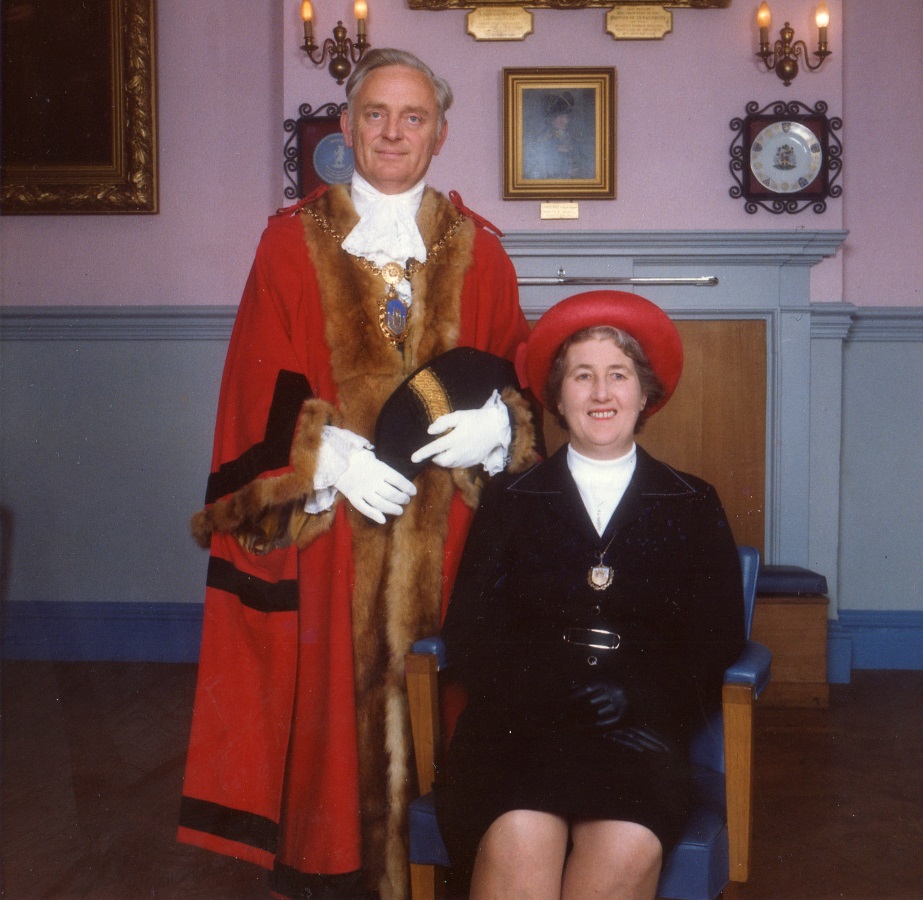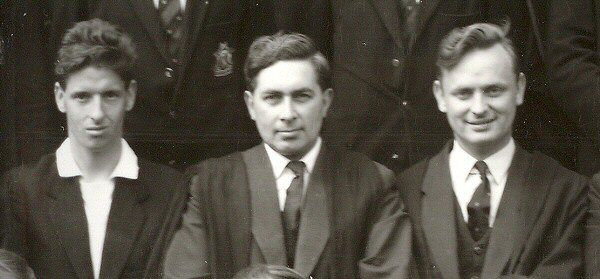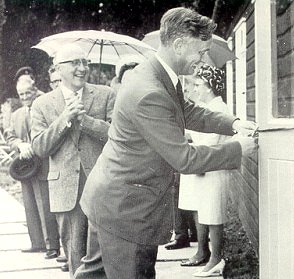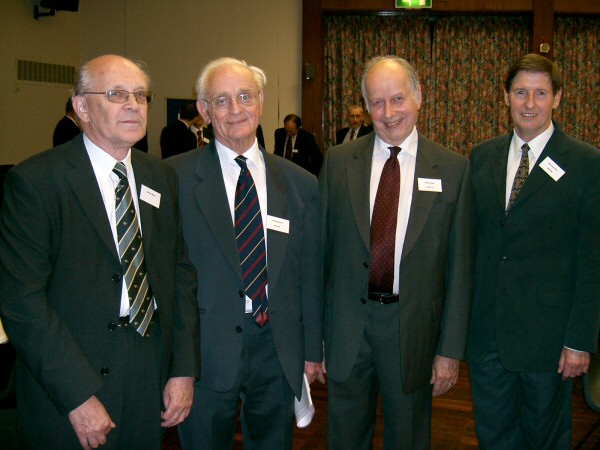Bill Rennison, 1929-2017
by John Dixon, assisted by Bill's son Peter
Tewkesbury History Society (THS)
https://tewkesburyhistory.org/Bill-Rennison
| Bill
Rennison was a founder member of and Treasurer to THS, author of
articles and an invaluable Historical Reference Book. In his
spare time, he was a Scout Commissioner, Mayor of Tewkesbury and
voluntary gardener at Bredon Manor. Much of that was
achieved in his fulfilling retirement; all shared and enjoyed by
his wife and consort, Ruth. He was probably the last of the
generation of teachers who managed to combine a demanding career
with civic service in their 'spare time'. Bill was officially known as ‘Jared William’ when he was born in 1929 – named after a grandfather who paid for his difficult birth in a private clinic. Bill’s father was a shipyard worker who survived the slump - and saved up for marriage – by working for a year in Venezuela. His father took the family to work in railway engineering in Doncaster where Bill was reared. There he thrived and one of his Grammar School teachers encouraged him to apply for a place to read History at Oxford. At a time when not many children from Doncaster went to University, let alone Oxbridge; as Peter commented, “he certainly did his bit for social mobility”. However, in 1947 an 18 year’s enforced priority was National Service which he spent – possibly because he had been a Sea Cadet - working in Haslar Naval Hospital in Portsmouth. He then entered St John’s College where his passion for history flourished. It was during this time that he met Ruth - a New Zealander who had sailed over “looking for adventure”. They were introduced and the rest, as they say, was history. They married in Newcastle, after a spell of teaching in Scotland and Huddersfield, where he had to teach French. |
 The Town Mayor and Mayoress in 1979 |
In his memoirs, the late Gordon Kaye, star of Allo, Allo
recalled that it was Bill who provided him with his first French lesson;
and the rest was “Franglais”! They enjoyed their early married years
teaching in Cambridgeshire where Janet was born in 1957 and Peter in
1960.
It was in 1967 that Bill won promotion as Second Master at Tewkesbury
Boys’ Grammar School in what was to be its final five years at Southwick
Park. 1972 was a year of educational revolution when Bill moved to
the new comprehensive school as head of Upper School and of course
teaching history where I met him as the 'Head of Department' in
1983. He retired in 1985 and I remember celebrating with them,
dining on a river boat on the Avon.
During this time he and Ruth were keen leaders of the Scouts and Guides
and he was a member of the Tewkesbury Choral Society. If this was not
enough service, he was a Councillor being elected Town Mayor in 1979.
Both he and Ruth thoroughly enjoyed their civic duties but, as a
principled Liberal politician, he resigned from the party in 1997,
disagreeing with the proposed, but ill-fated, 'Lib-Lab Pact', which Tony
Blair saw as a means of obtaining power.
At its foundation in 1991, this Society was fortunate to be supported by
Bill who rotated as treasurer with his neighbour, Bill Camp – they
proved very safe hands in those pre-computer days. Bill also
teamed up with Cameron Talbot to use their precious skills as Latin
scholars – a pre-requisite then for entry to Oxford – to transcribe
16-17th century wills, written in Medieval Latin. These have been
preserved as a bound volume in the Library and transcribed onto the
Society’s database for the benefit of posterity. The History of the
Society in its 10th year was written by Bill.
Ruth looked after me with her famous Pavlovas and it was a sad loss when
she died at so young an age - and just before the 2007 floods which so
afflicted him. Shortly afterwards, he left Tewkesbury for a
comfortable retirement home in Reading. It was an honour for me to
represent the Society, and join Bill and Ruth’s family at the funeral in
Reading of this Life Member - and to learn that he had settled so well
in his adopted area, partly because his love of choral music had even
extended to a Groovy Kind of Love.
Soham Grammarian Spring 1961
We extend our warmest welcome to Mr Ades, Mr Scott and Mr Sherrington who all joined us in September, and to Mr Rennison who took over the History department in January this year. Let us hope that their stay is long and enjoyable.
Soham Grammarian Summer 1967
We also said farewell to Mr Rennison, who goes to Tewkesbury Grammar School as Senior Master, and to Mr Royal-Dawson, who goes to the Leventhorpe School, Sawbridgeworth as Senior English Master. To both the thanks of all are extended for all their multifarious services, and our best wishes for their future happiness and success: we shall miss the quiet efficiency of the one and the equally quiet untidiness of the other.
We welcomed Bill to our 2007 reunion, brought by Warwick Ellis.

1965 school photo: Warwick Ellis - Norman Sherrington - Bill Rennison
| At Soham Grammar School, he - Jethro -
taught History at from January 1961 to July 1967.
Bill was a member of the staff badminton club formed by Warwick Ellis , took part in many school trips and helped on a number of productions. His contribution to the Scouting life of the school was recognised when he was invited to return in 1968 to open the new Scouting hut. |
 |
Educated at Doncaster Grammar School and St John's College Oxford, in 1954 he went to teach History at King James's Grammar School Almondbury, Huddersfield. As their website says "He lost no time in proposing a School Scout Troop, the investiture of which - as 46th Huddersfield troop - took place on 9th March 1955 with himself as Scout Master". The actor Gordon Kaye was in one of his Forms. From Soham he went to be Deputy Head at Tewkesbury Grammar School where he spent five "happy and I think productive years" until the four Tewkesbury secondary schools were combined in 1972 to become Tewkesbury School. For thirteen years he was head of Upper School, taking early retirement in 1985. |
 1959 |
The Rennisons decided to stay in Gloucestershire, in Tewkesbury, which is about the same size as Ely, but "much more friendly and interesting". Bill was on the Town Council for seventeen years and was Mayor in 1979-80.
In retirement he retained his Scouting connection, serving as District Commissioner and finally President. He sang in the choir of St Nicholas Ashchurch and with the Tewkesbury Choral Society.
He was a founder member of the Tewkesbury Historical Society and was Treasurer for many years and helped with the editing of the Annual Bulletin.
In 2006 he was widowed. His wife Ruth was a New Zealander and at one time he seriously considered emigrating there but the right post never came up. In retirement they had two long holidays in New Zealand and visited "most parts of that beautiful country".
In 2007 his was one of the homes devastated by the flooding that affected large parts of Gloucestershire.

At the 2007 Dinner: Gareth Woods - Bill Rennison - Peter Scott - Warwick
Ellis
see also:
The Hole
in the Ceiling Gang
Scouting
at SGS
Richard Brown 60 writes appreciatively of Bill in an autobiographical note on the History Zone which he edits:
At the beginning of the third year, history was taught by Bill Rennison: the Tudors and Stuarts and then British and European history 1815-1945 for O Level. He was a hard task-master and a stickler for detail and we argued continuously about history and politics from then until he moved to Tewkesbury Grammar at the end of my second year in the sixth form in 1967.
Bill was an excellent teacher, interested and interesting with a detailed knowledge and understanding especially of the seventeenth century. His lessons were discursive in nature and students were encouraged to express their own views on the issues being discussed though you had to be prepared to argue your case and Bill would not tolerate sloppy thinking.
When examining the Armada, I suggested that the English had been very lucky not to lose. Bill asked me to explain my thinking and then systematically debunked each point I’d made: an exhilarating experience since I probably learned more about the Armada as a result.
He was extremely encouraging bringing books and articles from his library and suggesting that I read and note them. I still refer to these on occasions as he had annotated my spidery notes with pithy comments again correcting poor reasoning and thought. Both orally and in writing, he contributed significantly to my development as a historian and I will always be grateful for the time he was prepared to expend on my ideas and writing.
Advanced Level was grounded in studying the sixteenth and seventeenth centuries in Britain and Europe with a special subject on the reign of Charles II. All the reading I’d done in the years before this paid off and I found an increasing pleasure in examining the complexities of the period.
The focus may have been on the political and diplomatic, a characteristic of much school history at this time but, for the first time there was a detailed examination of the social, economic, cultural and ideological dimensions of the past. This, combined with a heightened awareness of history as a discipline and as a set of ideas and methods made these three years a period of self-exploration and personal historical development.
I especially enjoyed the depth study of Charles II and remember giving class papers on the personality of Charles II and the political development of the Cabal, the governing group from 1667 until 1672, both lasting over two hours each. The school library had copies of the relevant State Papers that proved an invaluable source of information and ideas.
© Richard Brown 2010, reproduced here with his permission.